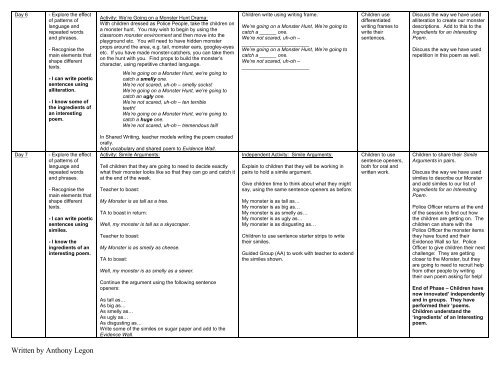Written by Anthony Legon Primary Literacy ... - The Literacy Tree
Written by Anthony Legon Primary Literacy ... - The Literacy Tree
Written by Anthony Legon Primary Literacy ... - The Literacy Tree
Create successful ePaper yourself
Turn your PDF publications into a flip-book with our unique Google optimized e-Paper software.
Day 6 - Explore the effect<br />
of patterns of<br />
language and<br />
repeated words<br />
and phrases.<br />
- Recognise the<br />
main elements that<br />
shape different<br />
texts.<br />
- I can write poetic<br />
sentences using<br />
alliteration.<br />
- I know some of<br />
the ingredients of<br />
an interesting<br />
poem.<br />
Day 7 - Explore the effect<br />
of patterns of<br />
language and<br />
repeated words<br />
and phrases.<br />
- Recognise the<br />
main elements that<br />
shape different<br />
texts.<br />
- I can write poetic<br />
sentences using<br />
similes.<br />
- I know the<br />
ingredients of an<br />
interesting poem.<br />
<strong>Written</strong> <strong>by</strong> <strong>Anthony</strong> <strong>Legon</strong><br />
Activity: We’re Going on a Monster Hunt Drama:<br />
With children dressed as Police People, take the children on<br />
a monster hunt. You may wish to begin <strong>by</strong> using the<br />
classroom monster environment and then move into the<br />
playground etc. You will need to have hidden monster<br />
props around the area, e.g. tail, monster ears, googley-eyes<br />
etc. If you have made monster-catchers, you can take them<br />
on the hunt with you. Find props to build the monster’s<br />
character, using repetitive chanted language.<br />
We’re going on a Monster Hunt, we’re going to<br />
catch a smelly one.<br />
We’re not scared, uh-oh – smelly socks!<br />
We’re going on a Monster Hunt, we’re going to<br />
catch an ugly one.<br />
We’re not scared, uh-oh – ten terrible<br />
teeth!<br />
We’re going on a Monster Hunt, we’re going to<br />
catch a huge one.<br />
We’re not scared, uh-oh – tremendous tail!<br />
In Shared Writing, teacher models writing the poem created<br />
orally.<br />
Add vocabulary and shared poem to Evidence Wall.<br />
Activity: Simile Arguments:<br />
Tell children that they are going to need to decide exactly<br />
what their monster looks like so that they can go and catch it<br />
at the end of the week.<br />
Teacher to boast:<br />
My Monster is as tall as a tree.<br />
TA to boast in return:<br />
Well, my monster is tall as a skyscraper.<br />
Teacher to boast:<br />
My Monster is as smelly as cheese.<br />
TA to boast:<br />
Well, my monster is as smelly as a sewer.<br />
Continue the argument using the following sentence<br />
openers:<br />
As tall as…<br />
As big as…<br />
As smelly as…<br />
As ugly as…<br />
As disgusting as…<br />
Write some of the similes on sugar paper and add to the<br />
Evidence Wall.<br />
Children write using writing frame.<br />
We’re going on a Monster Hunt, We’re going to<br />
catch a ______ one.<br />
We’re not scared, uh-oh –<br />
________________________<br />
We’re going on a Monster Hunt, We’re going to<br />
catch a ______ one.<br />
We’re not scared, uh-oh –<br />
________________________<br />
Independent Activity: Simile Arguments:<br />
Explain to children that they will be working in<br />
pairs to hold a simile argument.<br />
Give children time to think about what they might<br />
say, using the same sentence openers as before:<br />
My monster is as tall as…<br />
My monster is as big as…<br />
My monster is as smelly as…<br />
My monster is as ugly as…<br />
My monster is as disgusting as…<br />
Children to use sentence starter strips to write<br />
their similes.<br />
Guided Group (AA) to work with teacher to extend<br />
the similes shown.<br />
Children use<br />
differentiated<br />
writing frames to<br />
write their<br />
sentences.<br />
Children to use<br />
sentence openers,<br />
both for oral and<br />
written work.<br />
Discuss the way we have used<br />
alliteration to create our monster<br />
descriptions. Add to this to the<br />
Ingredients for an Interesting<br />
Poem.<br />
Discuss the way we have used<br />
repetition in this poem as well.<br />
Children to share their Simile<br />
Arguments in pairs.<br />
Discuss the way we have used<br />
similes to describe our Monster<br />
and add similes to our list of<br />
Ingredients for an Interesting<br />
Poem.<br />
Police Officer returns at the end<br />
of the session to find out how<br />
the children are getting on. <strong>The</strong><br />
children can share with the<br />
Police Officer the monster items<br />
they have found and their<br />
Evidence Wall so far. Police<br />
Officer to give children their next<br />
challenge: <strong>The</strong>y are getting<br />
closer to the Monster, but they<br />
are going to need to recruit help<br />
from other people <strong>by</strong> writing<br />
their own poem asking for help!<br />
End of Phase – Children have<br />
now innovated’ independently<br />
and in groups. <strong>The</strong>y have<br />
performed their ‘poems.<br />
Children understand the<br />
‘ingredients’ of an Interesting<br />
poem.


